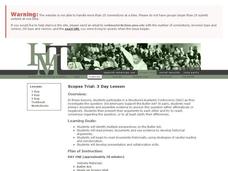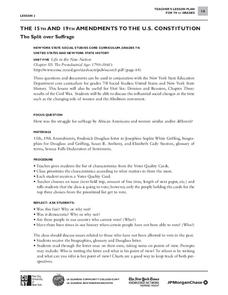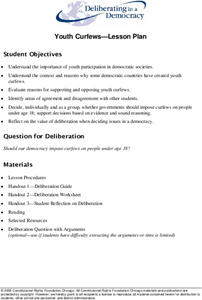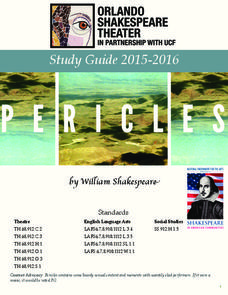Missouri Department of Elementary
Finding the Positive
To instill the importance of a positive classroom community small groups create a collage out of magazine clippings that highlight three characteristics of self-awareness. Written examples accompany the finished product. Groups turn in...
Minnesota Literacy Council
Introduction to Historical Thinking
Christopher Columbus: hero or villain? Prepare class members for the debate with activities that asks them to think critically about how history is reported.
Berkshire Museum
Backyard Rocks
You don't have to travel far to learn about rocks, just step outside, pick up a stone, and begin investigating. After taking a class walk around the school grounds collecting rocks, young scientists practice their skills of observation...
City University of New York
Women's Suffrage and World War I
Democracy cannot exist where not everyone has equal rights. Discuss the state of democracy and women's suffrage during World War I with class discussions, debates, and primary source analysis, in order for class members to connect with...
Fluence Learning
Writing an Argument: Is Electronic Communication Helpful or Harmful?
Technology has undoubtedly improved the lives of people around the world—but has it improved communication? Seventh graders read two informative passages about the rise of texting and emailing versus in-person conversations before...
Historical Thinking Matters
Scopes Trial: 3 Day Lesson
Was the Scopes trial more complicated than a simple debate between evolutionists and creationists? As part of a structured academic controversy (SAC) activity, pupils consider multiple perspectives of the Butler Act and engage in close...
Annenberg Foundation
Egalitarian America
What does a true American represent? Scholars investigate the equal rights era of the 1960s and 1970s in the 20th installment of a 22-part series on American history. Using photographic, magazine, written, and video evidence, groups...
Facing History and Ourselves
The Audacity of a Vote: Susan B. Anthony’s Arrest
Susan B. Anthony's speech "Is It a Crime for Women to Vote?" takes center stage in a lesson that asks class members to consider how they might respond to what they consider an unjust law. Groups work through the speech paragraph by...
Center for History Education
The Founding Fathers and the Constitutional Struggle Over Centralized Power
Believe it or not, the Constitution was America's second attempt at a democratic government. Academics travel back to the past to explore the shortcomings of the Articles of Confederation that would eventually lead to the Constitutional...
University of California
The Civil War: Emancipation
Investigate and analyze Abraham Lincoln's Emancipation Proclamation using primary and secondary sources. The sixth installment of an eight-part series analyzes the meaning of Lincoln's document in relation to its impact on the Civil War.
National Endowment for the Humanities
Life Before the Civil War
American life before the Civil War was very different from American life today. To show this difference in a full spectrum, learners compare two communities that illustrate the differences between Northern and Southern life. Throughout...
Historical Thinking Matters
Social Security: 1 Day Lesson
Should the United States provide relief for those who are unemployed? Trace this question back to the Great Depression with your young historians, who will engage in careful reading of historical documents and classroom discussion to...
National Endowment for the Humanities
Lesson 2: The United States, France, and the Problem of Neutrality, 1796–1801
While the French Revolution could be considered inspired by the American Revolution, it created thorny problems for the new United States. Should the United States get involved and be drawn into a European drama? Was the US strong...
Curated OER
Carta del tratado entre España y los Estados Unidos
Explore the history between Spain and the United States. Class members examine a copy of an original letter written in 1821 by Colonel Jose Coppinger in St. Augustine, Florida about the treaty that refers to the Florida territory that...
Federal Reserve Bank
Choices Are Everywhere: Why Can’t We Just Have It All?
Here is a resource covering a range of terms and concepts regarding scarcity, opportunity cost, and government debt in economics.
Curated OER
Our Classroom Constitution
Develop a system of classroom rules created by the kids, for the kids with this three-part instructional activity series on the US Constitution. After learning about the structure of the Constitution and the government it established,...
City University of New York
The 15th and 19th Amendments to the U.S. Constitution
Who gets to vote? Learn more about struggles for suffrage throughout United States history with a lesson based on primary source documents. Middle schoolers debate the importance of women's suffrage and African American suffrage before...
Constitutional Rights Foundation
Naturalized Citizens and the Presidency
Article II, Section 1 of the U.S. Constitution takes center stage in a lesson plan that asks class members to assume the role of state senators, debate a resolution to amend the U. S. Constitution to permit naturalized citizens to run...
University of California
The Civil War: Strategies and Battles
Was it the War against Northern Aggression or the War to Unify the Union? Scholars investigate the key battles and strategies of the American Civil War to determine just why the North was victorious in the end.
University of California
Decolonization
The ripple effect from one small event can impact many others. Young historians research the ripple effect World War II had on decolonization in the second installment of an eight-part series. Through primary and secondary documents as...
Deliberating in a Democracy
Juvenile Justice
Pupils compare and contrast the legal system as it pertains to juvenile and adult crime and punishment. Incorporating primary documents, legal decisions, and video evidence, individuals form an argument debating the treatment of...
Deliberating in a Democracy
National Service
Uncle Sam wants you to serve! Scholars investigate the role of mandatory national service in an open democracy. They research, watch a video, and hold a debate surrounding the issue of requiring one year of service to gain a better...
Deliberating in a Democracy
Youth Curfews
Don't stay out too late! Scholars analyze the need for youth curfews in a democratic society. They examine primary documents, case studies, and short video clips to form their opinions and take a position on the issue. Holding a class...
Orlando Shakes
Pericles: Study Guide
Everyone loves a great riddle, right? Everyone except for the characters in Shakespeare's Pericles, who will be killed unless they answer the king's riddle correctly. With the study guide, scholars use words coined by Shakespeare to play...

























